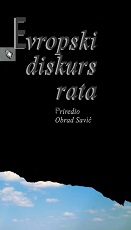
We kindly inform you that, as long as the subject affiliation of our 300.000+ articles is in progress, you might get unsufficient or no results on your third level or second level search. In this case, please broaden your search criteria.


Every Saturday for a period of two months, from the beginning of April till the end of June 1992, sessions organized by the Belgrade Circle were held at the Student Cultural Centre in Belgrade. At these sessions, ten in all, intellectuals, members of the Belgrade Circle and their quest – distinguished writers, scientists, artists, journalists, film and theatre directors, architects, actors, interpreters – expressed their own views of another, radically different Serbia. In times of anguish and affliction, the meetings, attended by a large assembly of listeners experiencing a kind of moral purification, were nonetheless imbued with a frail hope that there still might be a chance for a turn in events. With a desire to present ideas, opinions and sensations shared by the participants of the Belgrade Circle sessions to a much larger audience, the reading public, and to preserve them, because of their merit, in a more lasting form, discussions of over eighty intellectuals were compiled to form this book. In the meantime, the overwhelming disaster has reached its climax: »The Bosnian War«, still raging with no feasible way out as yet, exploded and blazed up like fire. The Belgrade Circle participants, distressed and abashed at the display of all those real or imagined evil deeds, so eagerly reported by the portentous heralds of death voiced hitherto often deeply hidden and silent feelings and thoughts about their burdensome disgust at the plague gripping and afflicting us all. Each participant contributed in his or her own way – rigorous scientific analysis, artistic susceptibility, eyewitness accounts, or simply. A public-minded desperate wail – to the shaping of one new, public opinion, the one that stirred in that sad Spring of ’92 and rebelled against the general fear, animosity, devastation, extermination, ethnic cleansing, forcible population exchanges... All those responsible and public-minded citizens, holding different political opinions, some members of various political parties, with incomparable personal experiences, varied professional interest and often of »objectionable« national origin, showed, however the will to insert tolerance among the basic principles of a humanized way of fife. But, in spite of the pronounced differences, their common aim, discernable in each and every speech imported to the audience, was to finally establish a community based on simple but as yet still unattainable ideals such as peace, freedom, tolerance and justice in place of degrading political, national and religious exclusiveness. Participants focussed their attention on various aspects of the problem: some analysed the roots of hatred and evil; some indicated the disastrous consequences of irresponsible national myth revivals; others warned of menaces yet to come unless we see reason in time. Some were stern, others witty and others still perhaps too prone to pathos, but they were all deeply concerned, and, as it unfortunately turned out, correct in predicting subsequent events. Therefore, individuals who take no notice of current, official policy and who have for a long time now tenaciously refused to render their talent and knowledge to the needs of the authorities, gathered round a project titled »Another Serbia«. Instigating a state of war and providing alleged erudite justification for the necessity of mutual extermination in the name of some noble goals, vague even to the very massacre executors, must not and cannot be the vocation of anyone who considers him or herself an »intellectual«, or earns a living acting as one. Hence, all session participants had but one desire: to mark out a path that may lead into a more promising future, to another, different, better and happier Serbia. »Another Serbia« soon became the synonym of resistance to fabricated lies, nationalistic madness, criminal war, a fascist holocaust, senseless destruction of villages and cities. Thanks are also due to the daily newspaper »Borba« which regularly reported on the Belgrade Circle Saturday sessions, and published a number of contributions presented there... We hope that the Another Serbia we all aspire to be easily discernable in the collection of essays presented in this book. The reader who hopes to find traces of at least some political program will be gravely disappointed. At present, when politics have poisoned the very soul of so many men of letters and knowledge, and when, among the most violent oppressors, in the ranks of all mortal enemy groups, one finds so many proud bearers of scientific degrees, who may actually be designated as men of unmerited and easily squandered reputation, it has become somewhat indecent to praise »intellectual pursuits«. The Belgrade Circle was, however, founded early in 1992 with the aim of retrieving dignity – another dangerous quality! – to public speech and conceived plans of action for the benefit of truth. We do not take an elitist position and stand indifferently above the crowd. On the contrary, being deeply involved and concerned, we place ourselves in its midst. The Association of Independent intellectuals insists upon its main goal, as declared in the program, namely, to bring together »critically oriented public figured who wish to unite their own civil and intellectual engagements with those of other, basically similarly oriented people«. That is why the Belgrade Circle will continue to »promote ideas, deeds and activities that affirm the values of a democratic, civil and plural society...« The Belgrade Circle will »encourage free and critical thought in all spheres of public life. It will support and help institutions and individuals who resist violence and animosity, and who plead for dialogue and for the survival of culture as the only humanly valid way of life«. Fine speeches? Maybe. Nevertheless, the Belgrade Circle has already, and despite many organizational and financial hardships, as well as ugly and unjust abuse from people who should have been, by the very nature of their vocation, in our ranks had they not knuckled under the burden of a more noble – national to be sure – mission, gained an undeniably high reputation. The words uttered with the aim of promoting »Another Serbia« and presented in this book to serve at testimony to the existence of a number of sensible people, shrewd and brave enough to resist suffocation by overwhelming absurdity, were not the only »weapon« used by Belgrade Circle members. They had also an active part in numerous civil and peace movements and events, thus contributing to the establishment of critical public opinion in Belgrade and Serbia: let us recall, for instance, the sad candles and our wake in the park, with souls colder than the Belgrade frost, while one of the past infernal wars – God, which one was it? – was raging out there somewhere; let us recall the »Black Band«, »Yellow Band«, »Student Protest ‘92«, and our endeavours to bring the people of Hrtkovci (»Srbislavci«) to reason; let us recall our guests from Pljevlja, Montenegro, Bosnia... All the time we were just launching our unhappy and, we believe, noble, though perhaps futile venture the very first participant said: let the Belgrade Circle begin it’s work! We hope that by offering this book to the public we have already come a long way.
More...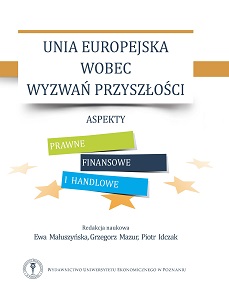
Zarówno w przedlizbońskim, jak i obecnym stanie prawnym wspólna polityka zagraniczna i bezpieczeństwa, jako płaszczyzna współpracy w ramach Unii Europejskiej, wyróżniała się i nadal wyróżnia na tle innych rodzajów polityki prowadzonych w traktatowych ramach tej organizacji. Najważniejsze kierunki ewolucji WPZiB wytyczyły dwa traktaty, a wiec traktat amsterdamski i traktat lizboński. Ten ostatni zasadniczo zmienił usytuowanie WPZiB w ramach UE, co wiązało się z likwidacją charakterystycznej, trójfilarowej konstrukcji prawnej UE oraz z istotnymi zmianami instytucjonalnymi w jej strukturze. Specyfika współpracy w ramach WPZiB spowodowała jednak, że została ona wyraźnie wyodrębniona zarówno z całego katalogu pozostałych unijnych rodzajów polityki, jak i z całej grupy działań zewnętrznych Unii.
More...
W ramach wspólnej polityki zagranicznej i bezpieczeństwa Unia Europejska stosuje sankcje mające wspomóc egzekwowanie jej celów, a zwłaszcza przestrzegania praw człowieka, demokracji i praworządności. Celem artykułu jest analiza skuteczności polityki sankcji Unii Europejskiej wobec Islamskiej Republiki Iranu. Zastosowaną metodą badawczą jest analiza porównawcza. Pierwsza część artykułu została poświęcona teoretycznemu ujęciu sankcji oraz czynnikom mającym wpływ na ich skuteczność. W następnym opisano podstawy systemowe wspólnej polityki zagranicznej i bezpieczeństwa Unii Europejskiej oraz zastosowanie sankcji jako jej elementu. W trzeciej części przedstawiono próbę oceny efektywności unijnej polityki sankcji wobec Iranu.
More...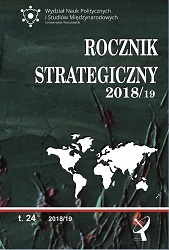
The aim of this article is to analyze the conflicts which were ongoing in 2018,in Yemen and Africa. The selection of armed conflicts was made on the basis ofthree main criteria: intensity, i.e. the scale of battle-deaths; internationalization, i.e.military involvement of third countries; the activities of jihadist groups. The articlediscusses armed conflicts in the Sahel region and the Lake Chad, in Libya, Somalia,and Yemen. As part of the Strategic Yearbook series that reviews current armedconflicts, this study is a continuation of the analyses from previous years. Its purposeis to explore the conditions and dynamics of the 2018 armed conflicts and theirimplications for international security. It explains the reasons of their increasingintensity and internationalization. The expansion of jihadist groups, especiallythose related to IS (Islamic State of Iraq and Levant, the so called Islamic State) orAl-Qaeda (AQ), is perceived as an important factor in this regard. It is argued thatthe activity of armed jihadist groups leads also to greater military involvement ofWestern states.
More...
The article offers an analysis of the most important energy market trends from theperspective of their importance for energy security and climate change. The energyand climate systems are two areas of human activity strongly influencing each other.On the one hand, the way energy is produced and consumed influences the globalclimate system, on the other hand, climate policy impacts energy security. The articletherefore focuses on the directions and dynamics of changes taking place in theenergy sector and which are of particular importance for global reductions of CO2emissions. It gives an insight into the policies of the world’s largest consumers offossil fuels and into the extent to which their activities favour energy transformation.This analysis critically assesses the feasibility of achieving the global climate policytargets set in 2015 in Paris. Especially importantly for the Strategic Yearbook, the2018 events and current trends serve as points of reference: the article outlines theconditions and results of climate negotiations of COP24 held in Poland and thenewest IPCC report on Global Warming of 1.5°C. An analysis of demand-supplytrends, recent trends in the area of CO2 emissions as well as current events leads toconclusions concerning some long-term challenges for energy and climate security.
More...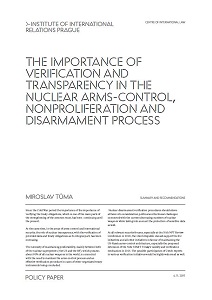
Since the Cold War period the importance of the importance of verifying the treaty obligations, which is one of the main parts of the strengthening of the common trust, has been continuing until the present. At the same time, in the areas of arms-control and international security, the role of nuclear transparency, with the verification of provided data and treaty obligations as its integral part, has been increasing. The necessity of maintaining predictability, mainly between both of the nuclear superpowers (the US and the RF), which possess about 90% of all nuclear weapons in the world, is connected with the need to maintain the arms-control process and an effective verification procedure in cases of other negotiated treaty instruments being concluded. Nuclear disarmament verification procedures should above all take into consideration political and technical challenges connected with the current decreasing numbers of nuclear weapons while taking into account the protection of sensitive data as well. At all relevant security forums, especially at the 10th NPT Review Conference in 2020, the Czech Republic should support the EU initiatives and all other initiatives in favour of maintaining the US-Russia arms-control architecture, especially the proposed extension of the New START Treaty’s validity and verification mechanism in 2021. The possible participation of Czech experts in various verification initiatives would be highly welcomed as well.
More...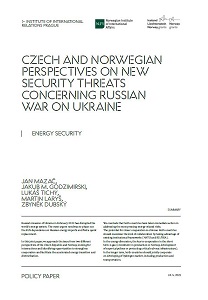
Russia’s invasion of Ukraine in February 2022 has disrupted the world’s energy system. The most urgent need was to phase out the EU’s dependence on Russian energy imports and find a quick replacement. In this joint paper, we approach the issue from two different perspectives of the Czech Republic and Norway, looking for intersections and identifying opportunities to strengthen cooperation and facilitate the accelerated energy transition and diversification. We conclude that both countries have taken immediate action in addressing the most pressing energy-related risks. The potential for closer cooperation is obvious. Both countries should maximise the level of collaboration by taking advantage of existing institutional frameworks (NATO and EU/EEA). In the energy dimension, the key to cooperation in the short term is gas (investment in production in Norway, development of export pipelines or protecting critical sub-sea infrastructure). In the longer term, both countries should jointly cooperate on developing of hydrogen market, including production and transportation.
More...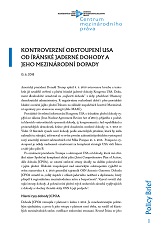
On May 8, 2018, US President Donald Trump went through with his threat and, this time, has not submitted his certification of the implementation of the Iranian nuclear agreement to the US Congress for approval. According to Trump, the document is the “worst deal” of Obama Democratic administration. He made his negative decision despite Iranʼs positive performance in the inspections by the International Atomic Energy Agency (IAEA).
More...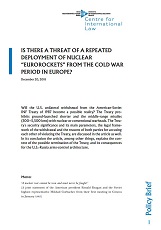
Will the U.S. unilateral withdrawal from the American-Soviet INF Treaty of 1987 become a possible reality? The Treaty prohibits ground-launched shorter and the middle-range missiles (500–5,500 kms) with nuclear or conventional warheads. The Treaty´s security significance and its main parameters, the legal framework of the withdrawal and the reasons of both parties for accusing each other of violating the Treaty, are discussed in the article as well. In its conclusion the article, among other things, explains the context of the possible termination of the Treaty, and its consequences for the U.S.-Russia arms-control architecture.
More...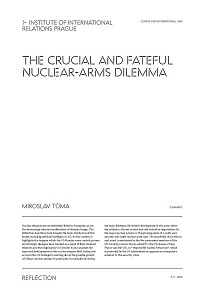
Nuclear weapons are an existential threat to humanity, as are the increasingly intense manifestation of climate change. The Reflection describes more broadly the main risk factors of this threat, including artificial intelligence (AI). In this context, it highlights the impasse which the US-Russian arms control process and strategic dialogue have reached as a result of their strained relations and the ongoing war in Ukraine. It also analyses the expected developments in the nuclear weapon field, taking into account the US Pentagon’s warning about the possible growth of China’s nuclear arsenal. In particular, it concludes by noting the main dilemmas for further development in this area: either the initiation of arms control and risk reduction negotiations by the major nuclear powers or the growing spiral of a costly and security-risk-laden nuclear arms race. The possibility of an ethical and moral commitment by the five permanent members of the UN Security Council, the so-called P5 (the US, Russia, China, France and the UK), to “responsible nuclear behaviour“, which is promoted by the US administration, appears as a temporary solution to this security crisis.
More...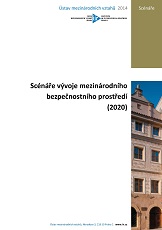
The document discusses the complexity of the global security environment and the emergence of hyper-risks due to interconnected anthropogenic systems. It suggests increasing resilience against hyper-risks by dividing existing systems into smaller units and creating circuit breakers to prevent cascading global reactions. The publication explores creative thinking about the future without precise probabilistic predictions, acknowledging the sudden and unexpected nature of significant events in complex systems, famously termed "black swans" by Nassim Taleb. It also examines geopolitical risks, the relative decline of US power, and the potential for a G-zero World scenario. The project's methodology is based on the complexity of the security environment, rejecting precise probabilistic forecasts and instead offering internally consistent hypotheses about future developments to aid in strategic thinking.
More...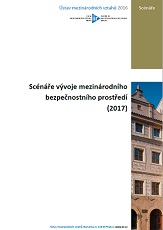
Držíte v rukou závěrečnou studii vznikající v rámci projektu TA ČR Scénáře mezinárodního bezpečnostního prostředí. Uzavírá se jí tříletý cyklus kolektivních spekulací týmu soustředěného v Ústavu mezinárodních vztahů o možnostech vývoje tohoto prostředí. Projekce, které vznikly jako výstupy těchto spekulací, nemají ambici být přesnými předpověďmi. Vysoká komplexita mezinárodního bezpečnostního prostředí jako systému, kde dochází k dynamické interakci množství předem daných skutečností, hybných sil a kritických neznámých, možnost takové předpovědi téměř vylučuje. Naše scénáře sledují jiný cíl: kombinací prediktivního (jaká budoucnost bude) a explorativního (jaká budoucnost může být) přístupu a záměrnou vícečetností podobně pravděpodobných projekcí vývoje v každém sektoru bezpečnostního prostředí být nástroji tvořivého promýšlení možných budoucností, rozšiřování horizontu úvah o tom, jak přispět k naplňování jejich z hlediska české zahraniční politiky nejvýhodnějších variant a zkoušení zažitých předpokladů o tom, co bezpečnostním prostředím, ve kterém se Česká republika nachází, hýbe.
More...
The war in Ukraine did not significantly affect the perception of the Serbian public regarding the major issues of Serbian foreign and security policy. In this context, this relates to how Serbian citizens think about the influence of great powers in their country and how the public perceives its relations with Russia and Western security institutions, the EU and NATO. The public opinion surveys also showed that the issue of Kosovo is still being perceived as a major foreign policy priority. There is a powerful cynicism in how the Serbian public views great power influences, as most respondents believe that external great powers bribe Serbian politicians and moguls to further their interests in the country. Russia and China are perceived as close foreign policy partners of Serbia, putting them in clear advantage over those who favour the EU on that front. The respondents also believed that Russia and China are sincere friends of Serbia and not players guided by their self-interest. As opposed to the study conducted by the Belgrade Centre for Security Policy (BCSP) in 2020, which noted that Serbs perceived Chinese influence in the country as more positive than Russian influence, the latest survey shows that those who believe Russian influence in Serbia is positive have a slight edge over those who believe the same about Chinese influence. This is most likely the result of the fact that China has not been in the spotlight in recent months.
More...
The Belgrade Centre for Security Policy conducted the annual public opinion survey on relations in the region, with a special focus on the Western Balkan countries and current events and trends. This report analyses Serbian citizens’ views on three main topics – the possibility of conflicts in the Balkans, Serbia’s bilateral relations with its neighbours, as well as key benefits and opportunities of regional cooperation and initiatives. Due to the current war in Ukraine and the war-mongering rhetoric in the Balkans, the fear of outbreak of conflict in the Balkans has risen. Compared to results from 2020, when more than half of citizens were not afraid of possible conflicts at all, the 2022 survey shows that almost two thirds of respondents are to a certain extent afraid of the outbreak of conflicts in the region in the next five years. Concerning potential causes of the conflict in the region, two-thirds of Serbian citizens believe that it is very or somewhat likely that a conflict might break out over the status of Kosovo. On the other hand, the results of the survey indicate a significant decrease in support of the reintroduction of mandatory military service, in comparison to results from 2020. When it comes to bilateral relations between Serbia and its neighbouring countries, the data shows a decline in support for potential separation of Republic of Srpska from Bosnia and Herzegovina and unification with Serbia. Citizens believe that relations between Serbia and Montenegro have not improved significantly, despite the signing of the Fundamental Agreement with the Serbian Orthodox Church. On the contrary, the negative perception of Serbian public towards Albania has slightly improved over the last two years, mainly due to the closer cooperation between the leaders of the two countries through the Open Balkan initiative. However, regional relations are still seen as strained, in part due to the promotion of the concept of Serbian world which creation is supported by slightly more than 40% of citizens. In 2022, the focus of the public in terms of regional cooperation was directed more directly to the Open Balkan initiative as a platform for collaboration between Albania, North Macedonia and Serbia. Although the data show an increase in the number of Serbian citizens who are familiar with the idea, there are still no concrete and publicly visible results of the initiative
More...
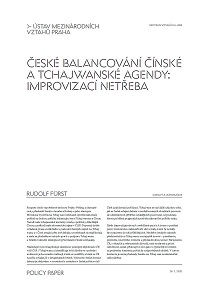
The contradictions surrounding the terminated Prague-Beijing treaty and the planned trips of Senate Presidents Jaroslav Kubera and his successor Miroslav Vystrčil to Taiwan have unexpectedly problematicized the view of Czech policy balancing between Taiwan and China. Will our Taiwanese contacts disrupt relations with the politically more important China and damage our economic interests in the PRC? The well-managed practice of simultaneously balancing Czech interests in Taiwan and China, lasting over two decades, has unexpectedly become complicated and has become the subject of sharp disputes about supporting Taiwan and defending national dignity from pressure from the Chinese embassy. The following text recaps the experience of the Czech Republic's dual diplomacy towards the PRC and Taiwan and identifies a crisis of confidence in the use of options that are easily offered, that have proven successful, and that the Czech Republic learned to manage already in the 1990s. The escalation of the Czech domestic debate is observed in connection with the split in Czech policy towards China and its domestic politicization. Taiwan has become another example of how the Czech public debate in mediatized abbreviations shifts to identity stories that distract attention from the essence, which is the common pragmatic need of the state's foreign policy. The conclusion recommends a return to proven practice and consideration of strengthening the positions of the Ministry of Foreign Affairs and the government, which should not be exposed to the role of bystanders. Visits by Czech state representatives to Taiwan at the highest level - the President, Prime Minister, line minister and chairmen of both chambers of the Parliament of the Czech Republic - for substantive and relevant reasons, it is not necessary to reject them a priori, but to proceed with them as exceptional steps subject to the consensus of politically responsible actors. In this context, the trip of the President of the Senate to Taiwan is insufficiently justified.
More...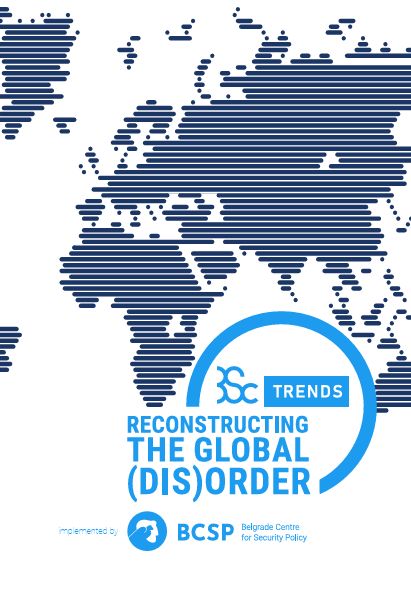
We proudly present you the ‘BSC Trends: Reconstructing the Global (Dis)Order,’ the companion publication to the Belgrade Security Conference 2023, held in Belgrade from October 11th to 13th, 2023. This publication aims to shed light on and discuss, following the style of BSC discussions, the most significant global, regional, and local events, phenomena, and developments that have marked this year. These topics were part of the panel discussions in this year’s BSC conference program.
More...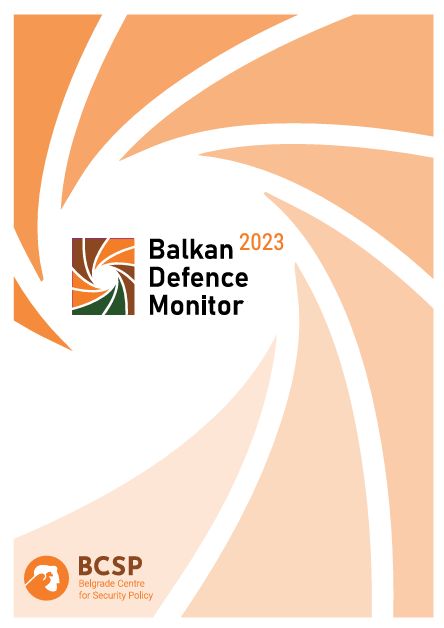
The main policy purpose of the Balkan Defence Monitor remains the same as in the last year. In recent years, the local elites have misused the lack of transparency related to defence policies in the Western Balkans, turning the military into a tool of domestic political promotion rather than a public good. This model of behaviour did not cause an armed conflict, and it is unlikely that it will do so in the future. However, it has poisoned the already fractious political ties between the countries of the region and fostered an atmosphere of distrust. To counter these negative occurrences, data on the defence sector needs to be made accessible to the citizens of Western Balkan countries and the international community. The ongoing war in Ukraine and the destabilisation of the European security environment make such an approach even more relevant.
More...
Defence system capturing is done in various ways. The authorities are using the procurement of armament from different parties to achieve foreign policy goals in order to reduce the external pressure on the authoritarian regime. Insisting on military neutrality and foreign policy balancing, Serbia is trying to keep access to both the Eastern and Western armament markets. Also, through non-transparent contracts, individuals and companies close to the government opulently profit at the expense of the military industry, as well as through exporting weapons often times conducted in contravention of both domestic and international law and norms.
More...